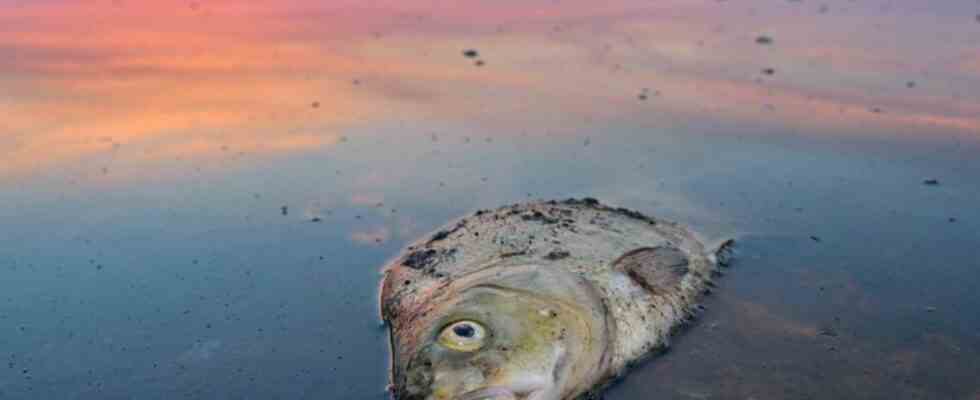or
Difficult research into the causes of fish kills
A dead lead in the Oder. photo
© Patrick Pleul/dpa
The search for the reason for the fish deaths in the Oder continues more than a week after the first dead animals were found on the German side – and is difficult.
The search for the cause of the massive fish kill in the Oder continues. According to the Brandenburg Environment Ministry, the Berlin-Brandenburg State Laboratory (LLBB) continues to examine water samples from different days and measuring points as well as fish.
Research into the causes is also difficult because information – including from the Polish side – on possible introductions or specific reasons for the environmental disaster is still missing, the ministry announced on Wednesday evening.
Ongoing investigations have so far yielded no clear evidence of a single cause for the fish die-off in the Oder, the ministry said. So far, analysis results have not shown particularly high values for metals such as mercury.
Expert: Growth of toxic algae probably the cause
Another expert saw the massive increase in certain algae as a decisive factor on Thursday. “For me, it is relatively plausible that this massive proliferation of algae has occurred – and in connection with this, the release of toxic substances produced by these algae is well documented,” said Jörg Oehlmann, head of the Aquatic Ecotoxicology department the Goethe University Frankfurt, the dpa.
“We also know that these toxins can cause such fish kills even at relatively low concentrations.” Whether these are ultimately blue-green algae or the toxic species of algae Prymnesium parvum, which was last identified in the Oder, remains to be clarified, says Oehlmann.
According to Oehlmann, the phenomenon of mass algae growth is either due to the high temperatures and strong solar radiation or the man-made introduction of certain substances.
Research into the causes of the catastrophe by analyzing the substances in the Oder is now a real Sisyphean task, since around 350,000 substances could potentially be present in a water sample – and even detailed diagnostics never cover them all. “It can take weeks before the substance behind it has actually been identified and can be named,” said Oehlmann.
According to the Polish government, toxic algae were also discovered in the water samples examined from the Oder. “Following further investigations, the Institute for Inland Fisheries in Olsztyn found rare microorganisms, so-called golden algae, in water samples from the Oder,” said Environment Minister Anna Moskwa. The bloom of these algae can cause the emergence of toxins that kill aquatic organisms such as fish and mussels, but are not harmful to humans.
EU Commission is pushing for results
According to its own statements, the EU Commission is extremely concerned and on Thursday pushed for results in the investigations into fish deaths in the Oder. “It is extremely important and urgent to determine the cause and take the appropriate measures downstream,” said a spokesman for the Brussels authority. “The sooner we can identify the cause of this ecological catastrophe, the sooner we can begin to manage and limit the wider impacts on wildlife, fisheries, agriculture and recreation,” the spokesman said.
The city of Frankfurt (Oder) asked the state to analyze the crisis management for the environmental disaster on the Oder. For example, in the first few days, false hopes about earlier laboratory results on fish deaths were fueled, said city spokesman Uwe Meier of the German Press Agency. Instead, the city was reprimanded by the country for its own initiative to collect the many dead fish.
Tourism businesses in Mecklenburg-Western Pomerania are increasingly feeling the effects of the massive fish kill in the Oder. “The high season ended abruptly,” said Elke Schmidt from Campingpark Oderhaff near Grambin to the German Press Agency. According to the Seenland Oder-Spree tourism association, there are also fewer holidaymakers in regions in Brandenburg directly affected by the fish kill.

